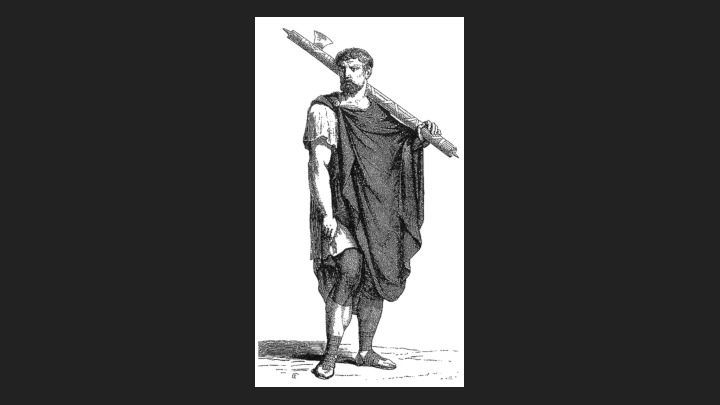Posté par Thomas Debesse le 22/09/2025 à 22:30. Licence CC by (copiez-moi !)
This is the official English translation of the French article: La religion qui a tué Charlie Kirk.
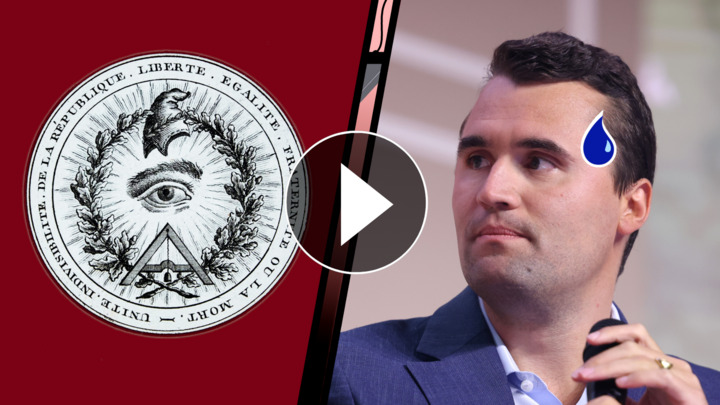
→ watch on the Youtube channel N’oubliez pas de vivre, in French with English subtitles (Licence CC By SA)
I don't know Charlie Kirk, but I know the religion that killed him. You know he was hated, but that hatred is not enough to call for his death. His death was called for by a theology.
[Don't forget to live]
I am not an American citizen, I live on the other side of the world and I am French. That is to say, Trump is not my president and Biden was not my candidate. I had no chance of meeting Charlie Kirk. Yet I have something important to bring you, even if you are not French, even if you are not American.
The religion that killed Charlie Kirk is of French origin, or at least France played a fundamental role in the development of this religion that killed Charlie Kirk. It is a religious war, and it was in France that this war of religious war began. It was also in France that this religion first took power and became powerful, and has been so for several centuries, enabling it to spread its deadly theology throughout the world and kill Charlie Kirk.
Let's take a look at History, but first I'll ask you a civics question: What is the motto of the French Republic? You will answer « liberty, equality, fraternity », but in saying that you will only be half right. You know part of the truth, but you are unaware of another part, because what you know is only a fragment of this motto, and without the entirety of this motto and its context, you cannot know its meaning. In fact, the meaning you spontaneously give it is apocryphal.
We must therefore go back to the French Revolution, and here is the complete motto: « unity, indivisibility of the republic, liberty, equality, fraternity or death ».
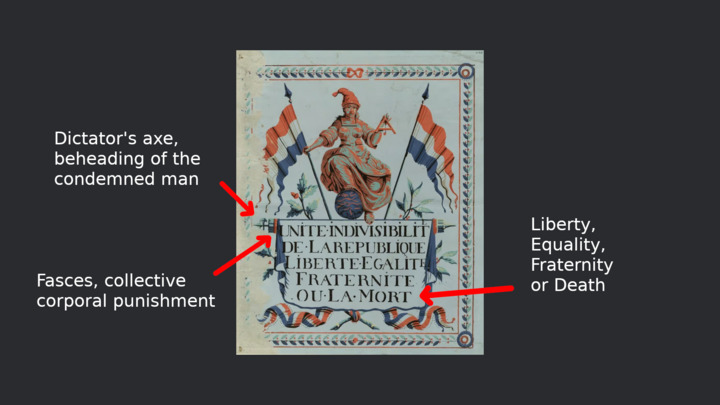
French revolutionary historical poster.
According to this French revolutionary motto, either you are a brother, equal and free, or you are dead.
Some might mistakenly believe that the expression « liberty or death » means fighting for one's freedom until death, and perhaps some have experienced it that way. But again, this is an apocryphal interpretation. The symbols associated with this motto remove any ambiguity, and actions have definitively demonstrated the exact meaning of this motto: either you are a brother, equal and free, or you are dead.
So how does the revolutionary decide whether you are a brother, free and equal, or whether you must die?
This is where we enter into religious dogma. In French revolutionary thought, nourished by the Enlightenment, the fraternity that makes you free and equal is produced by the social contract. It is a faith, a religious dogma: the revolutionary believes that nationality is produced by the social contract. According to this dogma, the social contract produces a new nation.
The French Revolution was a religious war, and the revolutionary religion is called contractualism.
The contract is a human tool, extremely useful and necessary. And as a thing, the social contract is an essential tool for the development of human society. But this contract is a thing, a tool, a creation. What the revolutionary does is elevate this thing, this creation, to the rank of divinity. He makes it an idol. Contractualism is the religion whose divinity is the social contract.
In this contractualist religion, the deity is not a personal deity, it is not a person. To understand this properly, we must rid ourselves of our religious presuppositions. We are familiar, for example, with Catholicism and Judaism, where the deity is a personal deity, meaning that man is in relationship with God person to person. But to understand contractualism, we must let go of this theological assumption because in contractualism, the deity is not a person; the deity is the contract.
This contract god is then held to be the cause of all reality, the source of all truth and all morality.
Understanding this theology is fundamental to understanding the dispute between Charlie Kirk and the contractualist religion. In Christianity, creation is ordered by a divinity external to man, according to rules external to man, which means that there is a truth and that this truth can be discovered by reason and verified by experimentation according to a scientific protocol. This is why Charlie Kirk spoke at universities. What Charlie Kirk practised was part of the Catholic tradition of disputatio, an essential practice of medieval scholasticism.
Contractualist faith is fundamentally, theologically, incompatible with this academic exercise of disputatio.
For the realist, the university and the assembly are places of research and debate to confront these research results and extract the truth from them. For the contractualist, the university and the assembly are places for writing the will and forming the consensus that must submit and compel the divinity to produce this desired truth.
In realist thinking, the one who does not reach consensus is either a contradictor who can help to find the truth, or, if he is an ignoramus, a liar or a sophist, leads away from the truth. In contractualist thinking, the one who do not reach a consensus is the one who prevents the deity from producing the truth that is demanded; his elimination is the ultimate means of giving the deity the power to produce this demanded truth by offering it absolute consensus. When the contradictor does not renounce his freedom, or if he is sufficiently good at refutation or affirmation and probation, his death becomes necessary to obtain consensus and necessary for the advent of the claimed reality.
That is why Charlie Kirk was killed. Contractualism has killed again. Contractualism killed Charlie Kirk.
The Catholic knows that even by meeting and agreeing with several people on what they want the world to become, this contract does not produce that reality. It is not enough to want it for it to happen. The contractualist believes this, sincerely, or at least he wants to believe it, because it is a dogma. In the contractualist system, anyone who does not believe in the creative power of this contract deity is not a brother, is not an equal, is not free, and deserves death.
The contractualist sincerely believes that it is enough to think very hard about something, to want it with all one's heart, all together, for it to happen. The contractualist believes that it is enough to declare how he wants the world to be, how he wants man to be, and that it is enough to obtain the adhesion of others in this will for this reality to come about. The issue of possible material incompatibility does not exist, because according to this belief, reality is decreed. By dogma, everything is a social construct, every common will is intended to be performative. But for the contractualist, what hinders this claimed performativity is not a possible incompatible property of reality, but the fact that the contract has not received full adhesion.
According to this belief, if a single person does not adhere to this contract, that person is held responsible for the failure of this new creation. Anyone who does not believe that the contract is God is then guilty of preventing God from acting. For the contractualist, the contract is god, and without this contract, creation cannot take place. As long as Charlie Kirk lives, the great evening cannot happen, the new human race cannot become, progress cannot be achieved, human nature cannot evolve, the superhuman cannot come into being, it is never true communism, etc. You know these phrases.
Moreover, this superstition manifests itself in quite diverse ways. There is, for example, the revolutionary who superstitiously believes that by killing all his opponents he will subdue the divinity to produce a new reality, and there is also, for example, the one who superstitiously believes that by simply saying « I do not contract », he too subjugates the deity to prevent it from producing this reality or, on the contrary, to produce a new one, by his sole supposedly performative decree. It is the same faith.
In contractualism, this belief is indisputable, it is a dogma: the social contract is the object of worship, it is held to be the cause of all reality, all truth, and all morality.
For example, this social contract god can supposedly produce the reality that a human being is not a human being based on their age, regardless of physical observations. Also, this social contract god can supposedly produce the reality that a human being is not a human being based on their infirmity or their opinions, which would supposedly make it possible to produce the morality of their assassination, for example.
The religion that killed Charlie Kirk is this contractualism.
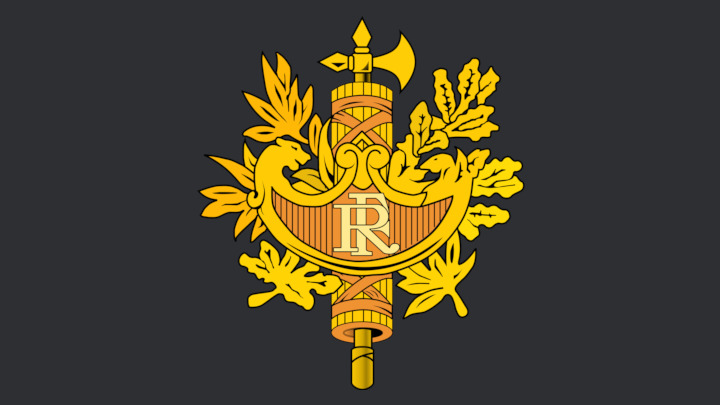
Current coat of arms of the French Republic with revolutionary fasces and the dictator's axe.
A constant that we find in contractualist dictatorships is the fact that in this theology, it is no longer the parents who produce the nation, it is not the family that produces the nation, it is not the family that produces fraternity. In contractualist theology, it is the social contract that produces the nation. This means that if you do not adhere to the social contract or if the social contract rejects you, you are not a brother, you are not free, you are not equal, you are dead.
Contractualism is the theology of socialism, and socialism is the political doctrine of contractualism. You will certainly recognise Russian Sovietism here, but also Italian Fascism and German Nazism. All these things are political applications of the contractualist dogma. For Nazism, it is even more obvious because it is the very name of this political formation: National Socialism is literally the nation produced by the social contract. National Socialism is simply the name given to the implementation of national contractualism in Germany in the 20th century. National Socialism aimed to produce a new nation through the social contract: the Aryan imagination, in order to replace the German nation. German citizens who were theologically incompatible with this contractualist religion, such as Catholics and Jews in particular, deserved death. It must be understood that the deported German was not foreign to the German nation, but he was foreign to the new nation that the Nazi social contract was supposed to produce. Any resistance to this doctrine had to die because it was considered the cause of the failure of the advent of this new Aryan replacement nation.

French revolutionary historical poster.
I show you this image again with the contractualist motto « liberty, equality, fraternity or death » written as a banner on the lictors' fasces tied around the dictator's axe. Here you have everything you need to understand this religious war.
The lictor was a man of the law in ancient Rome who had the power of immediate punishment. The French Revolution mythologised the lictor and reinterpreted this summary justice as the political application of this contractualist faith. The revolutionary identifies as a man who walks around with reeds tied together, the fasces, to designate a culprit, untie the sticks and distribute them to the crowd to beat him. The revolutionary particularity, unlike the lictor of antiquity, is that since it is the social contract that allows him to determine the guilt of the man, the revolutionary reinterpretation of the lictor is literally a ratonnade: physical violence against an ethnic minority or social group, ethnicity being in fact a purely social construct since, according to this religion, the nation is produced by the social contract.
This is why, under revolutionary and therefore contractualist influence, the social sciences can be subject to numerous biases in assessing what is a social construct and what is not, first because, according to this dogma, everything is created by the social contract, which is god, but also because such social constructs allow the revolutionary to create both the criteria for discrimination and the moral justification for his violence.
Let us return to this revolutionary symbol: these sticks are tied in a bundle around the dictator's axe, which is the name given to this axe which is intended for the execution of the condemned. Sometimes this dictator's axe is replaced by a pike, or a mixture of the two in a halberd. This symbol of the lictor's fasces surrounding the dictator's axe dates back to Roman antiquity and has been used as a symbol of authority and justice outside of contractualist theology. But reinterpreted by revolutionary socialist doctrine, particularly associated with the motto « liberty, equality, fraternity or death », this symbol is the symbol of the dictatorship that exterminates those who do not adhere to the social contract, or those whom the social contract rejects. The socialist, in his attempt to allow the contract deity to produce the new world and the new nation, kills all those who appear to him as an obstacle, those he considers not pure enough, not faithful enough, or simply those whom he refuses citizenship. Those rejected by the social contract are beheaded, but in practice, thanks to technicological progress, the guillotine is preferred to the axe for its efficiency, as the population is being reduced on a massive scale.
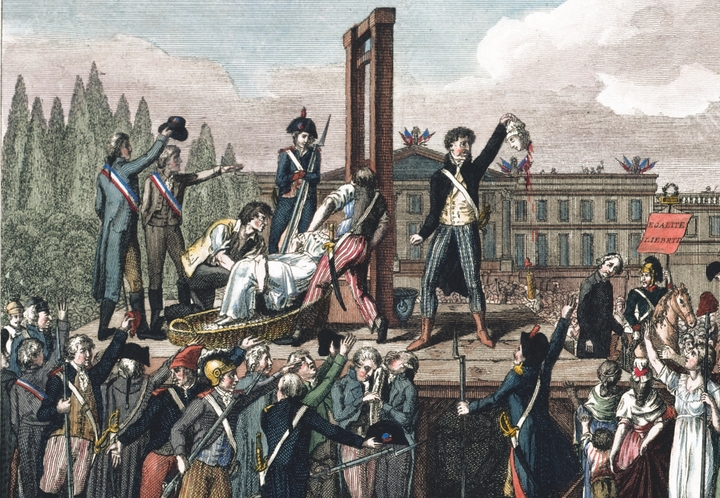
Beheading of Marie-Antoinette.
Robespierre said, for example, in 1792: « The monarchy has been annihilated, the nobility and the clergy have disappeared, the reign of equality begins ». From 1793 onwards, the Reign of Terror showed that it was not a matter of withdrawing privileges, redistributing wealth or dismantling social bodies. What was actually required to enable the social contract god to bring about this supposed equality was systematic elimination. Indeed, when everything that differs from you is dead, then all that remains is equality, unless it is solitude: « liberty, equality, fraternity, or death ». The contractualist needs to kill.
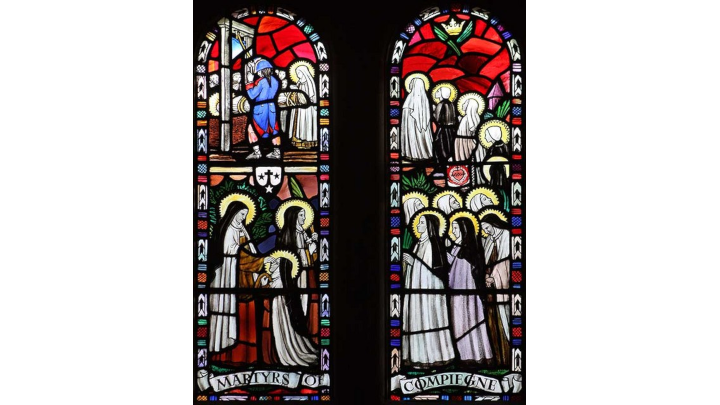
Beheading of the Carmelites of Compiègne.
And Lequinio said it only two years later in 1794: « it would be possible to exterminate only the foreigners, [...] but it is the priests, the nobles, the foreigners and the deserters mixed in among us who make their reduction impossible. It is therefore necessary to slaughter them all. [...] We must therefore decide to massacre everyone ».
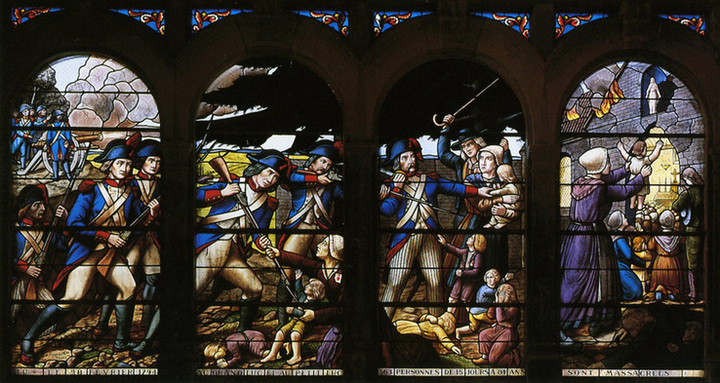
Massacre of Lucs-sur-Boulogne.
See, the contractualist can only reduce those who do not adhere to the social contract god through extermination.
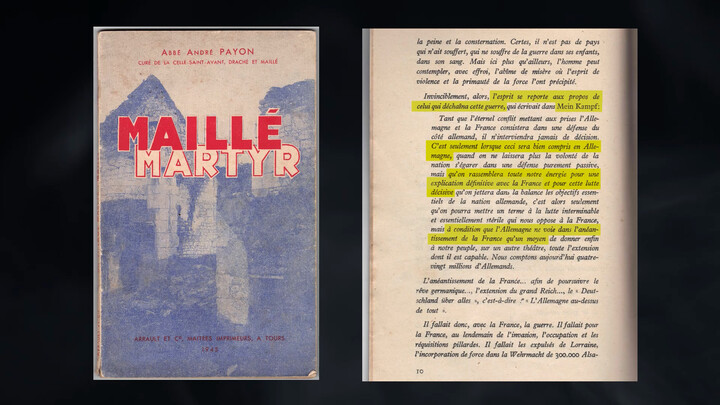
Book by Father Payon « Maillé Martyr ».
In 1945, Abbé Payon, parish priest of Maillé, a French village razed to the ground by the Nazis [and its population massacred, men, women, children], identified in this desire for the total destruction of his village the words of Hitler, who saw the total annihilation of France as the necessary means for the advent of his social contract god. I quote: « Only when this is well understood in Germany [...] will we gather all our energy for a definitive explanation with France and for this decisive struggle [...], on condition that Germany sees the annihilation of France as only a means. » The contractualist always needs a « final solution » as a means of bringing about his contract god.
It was this contractualist final solution that killed Charlie Kirk. The same as under the French Revolution in France, the same as under Nazism in Germany.
It is no surprise that Italian fascism also took up the symbol of the fasces with its Fasces of Combat, not only because it was a Roman and therefore Italian symbol, but also because Italian fascism adopted the French revolutionary reinterpretation of the fasces. Thus Mussolini said, « we are free to believe that this is the “collective” century », because in contractualist doctrine, it is this collective which, by producing the contract, submits the deity who must create the new world and the new race promised to the believer. The rejected of the contract deserves death, and this death of the rejected is necessary for adhesion to the social contract to be complete and for the divinity to be able to create, and to be subject to the will of those who draw up the contract.

French passport with revolutionary fasces.
As a French citizen, this symbol of revolutionary terror is present on my passport, as it is on all French passports.
Socialism is not a matter of social work, it has nothing to do with it. Being socially active, being involved in social work, does not make you a socialist. Socialism is contractualist theology transcribed into political doctrine; socialism is the armed wing of the faith in a contract that would be the creator god.
Socialism always promises a better world and a new nation to be created by the social contract deity. Rather than recognising the error of this superstition as the cause of the failure of this advent, the contractualist believer holds the very existence of those who do not share his faith to be the cause of the failure. The contractualist then has a duty to kill the realist in order to form the « collective » dear to Mussolini, which will adhere entirely to this unique contract so that the contract deity can create the new world and recreate the new nation.
I have used the word « realist » to refer to the non-contractualist because it is the word that refers to the philosophical principle that is fundamentally contrary to the contractualist principle. The term « scientist » is not sufficient because science, and therefore knowledge, can be distorted by lies. This knowledge must be knowledge of the real. The non-contractualist is not right-wing because the right does not exist. Only the left-wing exists, which defines itself as such because historically revolutionaries were seated on the left in the French hemicycle. The left-wing is the one who holds the guillotine, the one who kills. And it is the one who holds the guillotine who designates the « right-wing » . The concept of the right-wing exists only in the revolutionary expression of contractualist theology, and to speak of the right-wing is to engage in a discourse already colonised by this theology.
The revolutionary kills, systematically. He executes those he accuses of thwarting the social contract and the advent of the new world. The revolutionary kills first the figures, then the mass of the people. For the revolutionary discovers after each death that the new world he hopes for still does not come, so he continues to kill, man after man, woman after woman, child after child, in his blind quest to finally find satisfaction for his superstition.
Thus, General Grignon ordered in 1794: « I give you the order to set fire to everything that can be burned and to put to the sword all the inhabitants you encounter ». To which he was replied, « We kill nearly 2000 a day. [...] This morning I had 53 women killed, and as many children. [...] I burned all the houses and slit the thorats of all the inhabitants I found ». (General Duquesnoy).
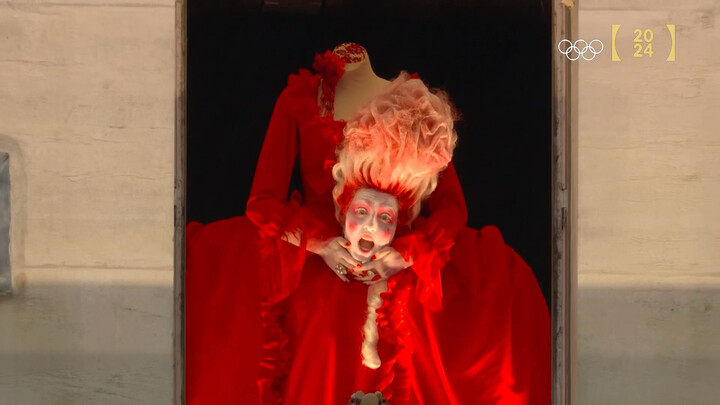
Celebration of Terror at the Paris 2024 Olympic Games.
So it is always death, the axe, the guillotine, terror, terrorism. We are very proud of the French Revolution, we carry the terrorist symbol of revolutionary death on our passports, we celebrated with the world mass slaughter by guillotine during the Olympic Games and we were congratulated for it...
We sometimes find it difficult to identify this contractualist ideology because it is constantly renewing itself with a new aesthetic. The aesthetic of the French Revolution is different from the Nazi aesthetic, the Fascist aesthetic, the Communist aesthetic, etc. You will never be able to denounce evil by naming only its disguises. You will never be able to denounce this evil by talking about the sound of boots, the nauseating smell, and the red-brown reflections. National contractualism is not a matter of uniforms, national contractualism is a matter of theology. This theology can dress itself in green or pink to survive and renew itself, or in any other new aesthetic that will make it appear attractive and new to new generations or new territories. And this theology has been fuelling a religious war for several centuries now, and this religious war killed Charlie Kirk.

Memorial of the White Rose in Saarbrücken.
I cannot help but see the resemblance between the Christian resistance fighters of the White Rose in Nazi Germany, who were guillotined for having distributed leaflets at a university, and the death of Charlie Kirk, a Christian shot in the neck, effectively having his throat slit, for having expressed his convictions during a debate at a university.
As Vincent Peillon, former Minister of National Education in France, said: « We can never build a country of freedom with Catholicism », he said this to promote his book « The French Revolution is not over » (2008). We are in a religious war, and we know the religion that killed Charlie Kirk: it is called national contractualism, or simply contractualism. It is the same religion that gave birth to and nurtured Nazism, Bolshevism, Fascism, and the French Revolution, and this religion kills. This religion does not tolerate contradiction. This religion requires total adherence, through submission and death if necessary; that is its most fundamental principle. In contractualism, there is freedom only if you have renounced your freedom. The question is not whether you are right or wrong. If you do not adhere to the social contract or if the social contract rejects you, you deserve death. It is as simple as that: « liberty, equality, fraternity or death ». In contractualist theology, whether you are right or wrong is irrelevant; the truth is irrelevant. In contractualist theology, contradiction deserves death on principle. In the contractualist catechism, contradiction is blasphemy against the god of the contract, and this blasphemy deserves death, not as a punishment, but as the necessary and sacred means of allowing the divinity of the social contract to find its perfection in order to be fully capable of realising the imagination of your dream.
In closing, I address these words to Charlie Kirk's wife, Erika, whom I do not know. I share with her these vital words of hope that I now pronounce in my prayer when I learn of the death of a loved one. They are words of hope and a very strong act of faith. The catholic believes in the resurrection of the flesh and in the communion of saints. This means that not only does the Catholic believes in the resurrection, but the Catholic also believes that in the communion of saints, he can be present through prayer at the moment of the resurrection of the loved one, and that he can even participate in his resurrection, right now. The Christian can pronounce with God in the communion of saints these words taken from the book of Ezekiel, chapter 16, this sentence that God has already pronounced to save us from death: « Live in your blood ».
The revolutionary says: « May impure blood waters our furrows », the Catholic says: « Live in your blood ».
And don't forget to live.
Thank you for listening, please share this video as widely as possible, subscribe to my channel if you can. I have only touched on the subject superficially, I hope to be able to make more videos on this subject. I am convinced that this is one of the most important topic for our century, and I think it is vital to expose this criminal religion. For as I have said, this religion is satisfied with any aesthetic. That is to say, it is not enough to defeat a party in an election, because without denouncing and rejecting the criminal contractualist religion, in order to win those same elections and remain in power, every party today needs to sacrifice to this religion. This is not a party matter; we must defeat evil at its source.
